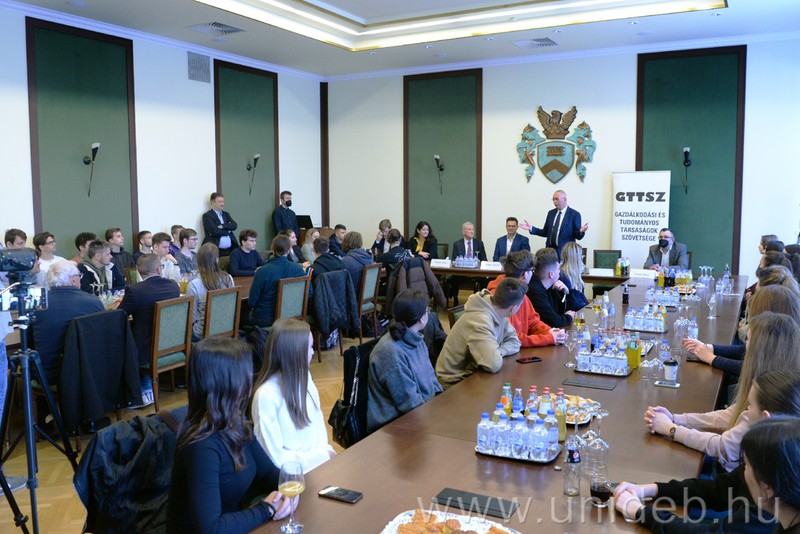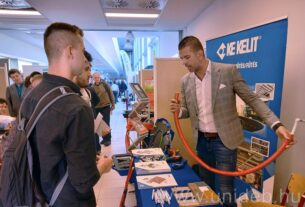Zoltán Birkner, President of the National Office for Research, Development, and Innovation called the role of universities in the innovation ecosystem, organized by the institution, the Association of Management and Scientific Societies, and the Hungarian Vocational Training Center of Debrecen.
Innovation means the entire chain from discovery and research to series production and distribution. The University of Debrecen has made every effort to carry out this difficult process successfully with the help of a corporate cooperation system.
– said Zoltán Szilvássy, Rector of the University of Debrecen, in his speech at Tuesday’s meeting.
The head of the university also mentioned that the first innovation program with an agricultural tender was launched at the university 15 years ago. Since then, the institution has built a vertically organized, university-centric innovation system of 350 companies. Its effectiveness has also been recognized by one of the world’s leading technical universities, the Massachusetts Institute of Technology (MIT), allowing DE to partner as a partner in the European adoption of the MIT Catalyst methodology.
Antal Janzsó, Deputy Secretary-General and President of the Higher Education Section of the Association of Business and Scientific Societies greeted the participants on behalf of GTTSZ. In his opinion, we live in special times, one of the characteristics of which is that the change is continuous, and the pace of change is also increasing.
However, it is important not to be afraid of change, but to see the opportunity in it. I think the beginning of the 21st century can also be described by the fact that two contradictory situations, namely competition and cooperation, are present together. We need to learn to live together so that these two things move us forward. Infocommunication technology is infiltrating more and more layers of today. We live in a world of artificial intelligence and robots. The changing situation also has an impact on human resources. We need to acquire competencies during the learning period that can make us successful and then happy. This imposes a big, many, but also noble task on educational institutions
– explained Antal Janzsó.
Zoltán Birkner, President of the National Office for Research, Development, and Innovation, gave a presentation on the role of universities in the renewable innovation ecosystem.
He said that they work with 6-7 thousand young people a year in various programs, and compared to HUF 85 billion in 2018, the agency issued more than twice as many applications in the field of research and development and innovation last year. According to the President, in the next 20 years, countries, where there is room for creativity and innovation, will come to the fore, while others may lag behind. That is why the Hungarian government has been building a university-centered innovation ecosystem focused on universities in recent years. As he said, the university network is the most prepared for this role, and the institution in Debrecen has a prominent place in market thinking.
The most significant development that will start in the near future is the network of science and innovation parks, for which the government is allocating HUF 600 billion in support to create a technical, technological, and physical space for new industries on a university basis. Laboratories, buildings and industrial halls are born. There will be fourteen such bases in order for new types of industries to grow in Hungary. The University of Debrecen excels in the Hungarian system. The university obtains a lot of resources, competes, and moves very efficiently in the field of research and development and innovation. DE operates as one of the most marketable universities today and is a good example to many,
– stressed the president, who said their ambitions could have spectacular results by 2025.
Ákos Pintér, the general deputy rector of the University of Debrecen, explained primarily to the students that innovation is not possible without human resources. In his lecture entitled Programs of Excellence and Innovation at the University of Debrecen, he explained that the university has worked on eight subject areas in the recent period.
Automotive, insulin resistance, space and therapeutic developments, biotechnology, energy, water research and big data. The latter five are part of the Institutional Excellence Sub-Program of the Thematic Excellence Program. Many young researchers have joined these thematic programs, which has a good effect on the institution’s scientific training,
– said Professor Ákos Pintér, and thanked the National Office for Research and Innovation for its support.
At the conference, Kornália Lazányi, a professor at the University of Óbuda, the president of the Youth Section of GTTSZ spoke about the human side of innovation, while Csaba Árendás, the innovation manager of the University Research and Innovation Center, shared his thoughts with the participants entitled with young people.
hirek.unideb.hu


















